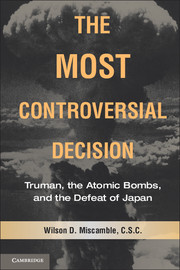Book contents
- Frontmatter
- Contents
- Acknowledgments
- Map 1 The Atomic Bombing of Japan
- Introduction: The Most Controversial Decision
- 1 Franklin Roosevelt, the Manhattan Project, and the Development of the Atomic Bomb
- 2 Harry Truman, Henry Stimson, and Atomic Briefings
- 3 James F. Byrnes, the Atomic Bomb, and the Pacific War
- 4 The Potsdam Conference, the Trinity Test, and Atomic Diplomacy
- 5 Hiroshima, the Japanese, and the Soviets
- 6 The Japanese Surrender
- 7 Necessary, But Was It Right?
- 8 Byrnes, the Soviets, and the American Atomic Monopoly
- 9 The Atomic Bomb and the Origins of the Cold War
- Suggested Readings
- Index
3 - James F. Byrnes, the Atomic Bomb, and the Pacific War
Published online by Cambridge University Press: 05 June 2012
- Frontmatter
- Contents
- Acknowledgments
- Map 1 The Atomic Bombing of Japan
- Introduction: The Most Controversial Decision
- 1 Franklin Roosevelt, the Manhattan Project, and the Development of the Atomic Bomb
- 2 Harry Truman, Henry Stimson, and Atomic Briefings
- 3 James F. Byrnes, the Atomic Bomb, and the Pacific War
- 4 The Potsdam Conference, the Trinity Test, and Atomic Diplomacy
- 5 Hiroshima, the Japanese, and the Soviets
- 6 The Japanese Surrender
- 7 Necessary, But Was It Right?
- 8 Byrnes, the Soviets, and the American Atomic Monopoly
- 9 The Atomic Bomb and the Origins of the Cold War
- Suggested Readings
- Index
Summary
A proper accounting of the development of American policy to defeat Japan and bring World War II to an end must take due note of the crucial role played by James F. Byrnes. Although he is not well-remembered today, the experienced South Carolinian possessed tremendous gifts for politics. His insightful biographer rightly titled his study Sly and Able. Comparing FDR and Byrnes, David Robertson asserted with some justification that “Roosevelt publicly outshone Byrnes at making friends; but behind the scenes Jimmy Byrnes was the better politician, and he knew it.” By the time he took command at the state department he had held a number of positions any one of which might have served others as the culmination of a fine career – senate majority leader, Supreme Court justice, and director of the Office of War Mobilization and Reconversion (OWMR), where his tremendous work running the home front earned him the sobriquet of “assistant president.” Byrnes reacted to the disappointment of being passed over as FDR's running mate in 1944 with outward calm and true professionalism. His self-confidence and high regard for his own capacities were in no way damaged. He continued his important work at OWMR and spoke in support of the Roosevelt-Truman ticket. Perhaps he hoped that FDR would select him to succeed his good friend Cordell Hull at the state department, but the president judged Byrnes too independent for that task and picked the more malleable Edward Stettinius.
- Type
- Chapter
- Information
- The Most Controversial DecisionTruman, the Atomic Bombs, and the Defeat of Japan, pp. 40 - 53Publisher: Cambridge University PressPrint publication year: 2011

